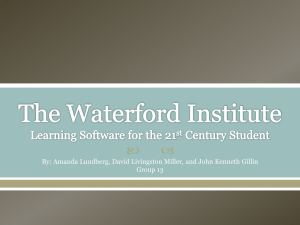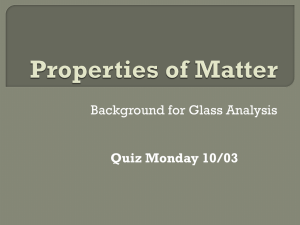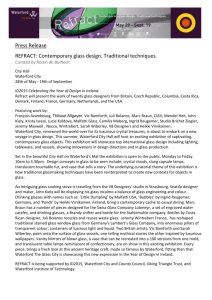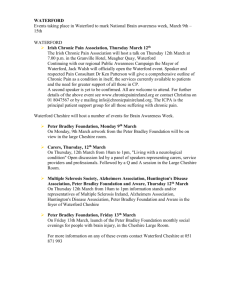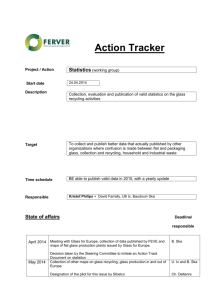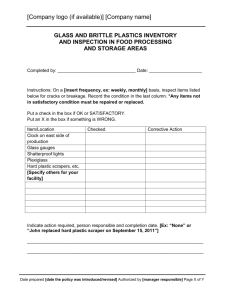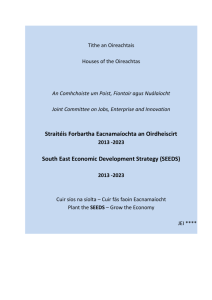Tender for Contract Developing the Vision for Waterford as an
advertisement
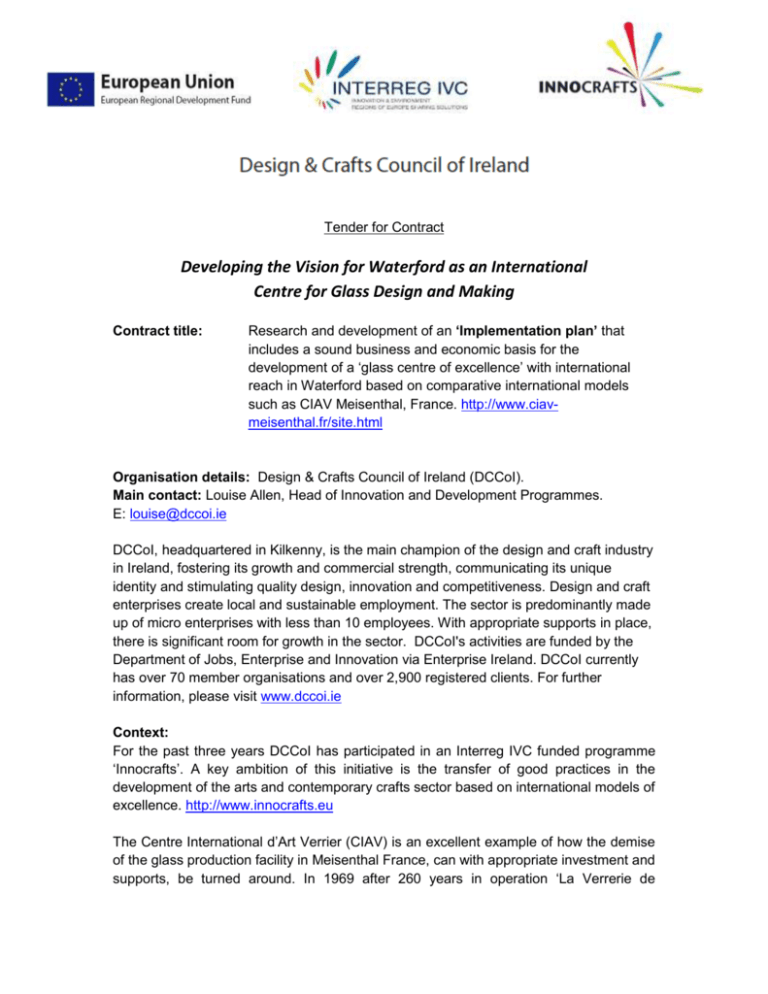
Tender for Contract Developing the Vision for Waterford as an International Centre for Glass Design and Making Contract title: Research and development of an ‘Implementation plan’ that includes a sound business and economic basis for the development of a ‘glass centre of excellence’ with international reach in Waterford based on comparative international models such as CIAV Meisenthal, France. http://www.ciavmeisenthal.fr/site.html Organisation details: Design & Crafts Council of Ireland (DCCoI). Main contact: Louise Allen, Head of Innovation and Development Programmes. E: louise@dccoi.ie DCCoI, headquartered in Kilkenny, is the main champion of the design and craft industry in Ireland, fostering its growth and commercial strength, communicating its unique identity and stimulating quality design, innovation and competitiveness. Design and craft enterprises create local and sustainable employment. The sector is predominantly made up of micro enterprises with less than 10 employees. With appropriate supports in place, there is significant room for growth in the sector. DCCoI's activities are funded by the Department of Jobs, Enterprise and Innovation via Enterprise Ireland. DCCoI currently has over 70 member organisations and over 2,900 registered clients. For further information, please visit www.dccoi.ie Context: For the past three years DCCoI has participated in an Interreg IVC funded programme ‘Innocrafts’. A key ambition of this initiative is the transfer of good practices in the development of the arts and contemporary crafts sector based on international models of excellence. http://www.innocrafts.eu The Centre International d’Art Verrier (CIAV) is an excellent example of how the demise of the glass production facility in Meisenthal France, can with appropriate investment and supports, be turned around. In 1969 after 260 years in operation ‘La Verrerie de Meisenthal’ closed its glass production facility with devastating effect on the local and regional economy. In 1992 the facility was re-opened as The Centre International d’Art Verrier (CIAV) to celebrate the Art of Glassmaking and to promote and share knowledge and innovation. Today it is a thriving centre for research, exhibition and a tourist destination. The history of the glass making facility and the impact its demise had on employment, loss of skills and on the local economy closely mirror the demise of Waterford Wedgewood’s production facility in Ireland in 2008. In July 2014, Innocrafts funded a delegation that included senior executives from Waterford Local Authority, Waterford Institute of Technology, Waterford Viking Triangle and DCCoI to travel to CIAV. As part of the research process a facilitated workshop with the group who visited CIAV will be a core part of the consultation process. In this context and funded through Innocrafts programme, DCCoI are now inviting tenders to develop an implementation plan that examines the need and potential from business, innovation, skills, cultural, tourism and economic perspectives for the development of a similar facility in Waterford. The implementation plan should provide: 1. A detailed rationale for the development of a glass centre of excellence in Waterford based on the local area and the potential impact the development will have on the craft, design and complimentary sectors. 2. A comparative analysis with geographic data and analysis, economic assessment and impacts direct and indirect; job creation potential, skills preservation and impacts on professional glassmakers, on the development of the glass sector, on research and skills preservation and future growth. 3. Identify ways to work with multiple partners (Local authority, Waterford Institute of Technology, Viking Triangle, Local Enterprise Office, Local Development Company) to harness the required support and develop the necessary infrastructure. 4. Assess inhibitors/enablers to growth including analysis of infrastructure, national and international markets, networks of support, access to finance and should include comparisons with challenges and opportunities experienced in the development of CIAV Miesenthal or similar facilities. 5. Highlight the potential application and impact of access to skills, expertise and equipment that enables localised manufacturing and production through the innovative use of new technologies for the glass sector 6. Assess existing and required education, skills and training needs. 7. Identify any potential for growth through complementary/synergistic alliances: tourism, environment, culture & heritage, sustainability, food, community development etc. 8. Examine the context and/or infrastructure whereby skills development, research, collaboration, sharing of cross-sectoral knowledge and expertise is facilitated and the benefit of this to stakeholders and the wider community 9. Highlight opportunities to promote or work inter-territorially/transnationally with other EU countries. 10. Provide a clear assessment on how the recommendations and proposed actions may impact on broader societal objectives in respect of quality of life and community development. 11. Attention should also be given to recommendations with regard to the generation of policies and infrastructure that will facilitate the on-going development of the glass sector generally. 12. The report should compile findings and associated data, inventories, maps, assumptions and conclusions into an accessible report that can be used to help the consortium partners to justify investment in the sector and to ensure that investments are appropriately targeted and complementary to local developmental objectives. 13. Details of the assumptions made for the analysis must be provided and the derivation of all figures used in the analysis shall be described. Key Deliverables: Comprehensive report that provides the following: 1. An accurate assessment of and business case for the feasibility of a glass centre of excellence based in Waterford. 2. A demonstrable need for such a centre and the likely impacts it would have on the business, innovation, skills, cultural, tourism and economic development of Waterford City and County. 3. Assuming there is a justified basis for development: An implementation plan detailing actions required at National, Regional and Local levels to ensure progress and development of recommendations. 4. An estimated timeline for development to include indicative infrastructural and day-to-day running costs. 5. Other economic effects deemed significant e.g. cluster possibilities; links to EU policy and financing programmes and a clear assessment on how any spill over effects may impact on the broader craft and design industry. All data sources and other information must be referenced with footnotes. ***Please note, tenderers are encourage to input their professional expertise in terms of devising the best possible methodology to meeting the terms of the Scope of the Contract*** Delivery: Research to be conducted from September– October 2014. Tenderers are requested to suggest appropriate stages – programme schedule and a suggested timeframe for delivery. Tenderers must identify (including relevant experience) the programme principle/ team lead/ co-ordinator. The team must include an appropriate expert on glass. DCCoI reserve the right to make recommendations in this regard. Tenderers must identify (including relevant experience) personnel involved in the delivery of the programme or any proposed arrangements to sub-contract out development and delivery. Budget: Programme budget should cover all programme design, development and delivery costs. The programme costs are estimated to be in the region of €12,000 all-inclusive. Selection criteria: The successful tenderer will be required to provide a current Tax Clearance Certificate and all appropriate insurances. Tenders must be able to demonstrate prior relevant experience in the design, gathering and analysis of quantitative and qualitative data and a comprehensive understanding of the dynamics of the craft sector. Award criteria: Tenders will be evaluated on the following criteria: 1. 2. 3. 4. Criteria Weighting Understanding and interpretation of the brief Relevant prior experience detailing key delivery personnel; knowledge & understanding of the dynamics of the Irish glass, design and craft sectors; Techniques for quantitative and qualitative data analysis Price Methodology and innovation 15 35 30 20 100 Tender responses: Tender responses should address each of the award criteria as well as the contract specifications comprehensively Tender schedule: Closing date for submissions is 29th August, 2014 at 5pm. Cut-off for receipt of queries is 26th August, 2014 at 5pm. Queries to be emailed to: louise@dccoi.ie All queries will be answered in one document thereafter. Delivery of tenders: Submit tenders as ONE PDF DOCUMENT to louise@dccoi.ie Contract terms: Up to five stage payments of equal value to the value of the contract can be facilitated.


![South east presentation resources [pdf, 7.8MB]](http://s2.studylib.net/store/data/005225551_1-572ef1fc8a3b867845768d2e9683ea31-300x300.png)

